What makes veggies so good for us?
By Beth Cecil
Owensboro Health Healthpark dietitian
We were talking during dinner last night and I told the kids that this month was Fruits & Veggies More Matters™ month. We talked about trying to eat more fruits and vegetables, their benefits, and even decided to begin a little family contest to track our daily consumption of them.
We have all likely heard the statistics that on average Americans aren’t eating enough fruits and vegetables each day. We also know that fruits and vegetables are good for us. They are low in fat, calories and cholesterol and are good sources of fiber, vitamins and minerals. But what else makes them so beneficial? This is the question I posed to my kids last night.
The answer is phytochemicals. I asked my kids specifically if they have ever heard of phytochemicals or knew what one did. Nathan thought for a few minutes and then said, “they fight off bad germs”. Shelby thought too, and added, “they help make you stronger”. Hey, good answers, I thought, maybe they really do listen to me every once in a while.
While my family probably has a distinct advantage, I find that many of us, adults and children alike, don’t really know what a phytochemical is. And that is okay; because it wasn’t until just a few years ago that the term “phytochemical” was even heard of.
I have referred to phytochemicals many times in this column, but am not sure I have really gone into much more detail. So here is an overview.
 Phyto comes from the Greek word for plants. Phytochemicals are a wide variety of compounds or non-nutritive chemicals produced in plants that have protective or disease-preventing properties. Fruits, vegetables, grains, beans and other plants contain phytochemicals. While scientists to date have identified several thousand of these, only a small number have been studied closely.
Phyto comes from the Greek word for plants. Phytochemicals are a wide variety of compounds or non-nutritive chemicals produced in plants that have protective or disease-preventing properties. Fruits, vegetables, grains, beans and other plants contain phytochemicals. While scientists to date have identified several thousand of these, only a small number have been studied closely.
What makes phytochemicals exciting is their apparent ability to prevent diseases like cancer and heart disease. They seem to inhibit actions of the body that are associated with the development of various diseases. Different phytochemicals have been linked to different body processes, but include such benefits as improving LDL (or bad cholesterol levels), lowering cholesterol and blood pressure, boosting immune function and fighting off certain forms of cancer.
Some phytochemicals may be very familiar to you such as beta-carotene, ascorbic acid or vitamin C, folic acid and vitamin E.
There are other groups of phytochemicals such as flavonoids, carotenoids, and allyl sulfides. Many of these phytochemicals work as antioxidants, which you may remember work to rid the body of harmful molecules known as free radicals.
The chart below shows just a few examples. While some of these terms may be new to you, the foods that contain them are not. Hopefully, you will have no trouble including them in your diet.
While optimal levels of phytochemicals in your diet have yet to be determined, the bottom line is to increase your overall consumption of fruits and vegetables, especially if you get less than five servings a day. And “eat your colors” so that you may get a wide variety of these naturally occurring treasures.
|
Phytochemical |
Health Benefit |
Food sources |
|
Organosulfurs |
May help prevent cancer |
Cabbage, Brussels sprouts, cauliflower, broccoli, dark leafy vegetables
|
|
Lycopene |
Powerful anti-oxidant, role in the prevention of prostate cancer |
Red-fleshed fruits and veggies such as tomatoes, red peppers, pink grapefruit and watermelon |
|
Allyl Sulfides |
Rid the body of harmful substances, strengthen the immune system |
Onions, garlic, scallions, chives |
|
Ellagic Acid |
Anti-cancer effects and role in preventing heart disease by making blood less likely to clot |
Raspberries, strawberries, cranberries, blackberries |
|
Anthocyanidins |
Antioxidants that may protect against heart disease and some cancers |
Grapes, eggplant, red cabbage, radishes, berries |
|
Quercetin |
Antioxidant |
Apple, citrus fruits and onions |
|
Lutein and zeaxanthin |
May reduce risk of some cancers |
Romaine lettuce, dark leafy greens (turnip, kale, spinach), corn and citrus fruits |